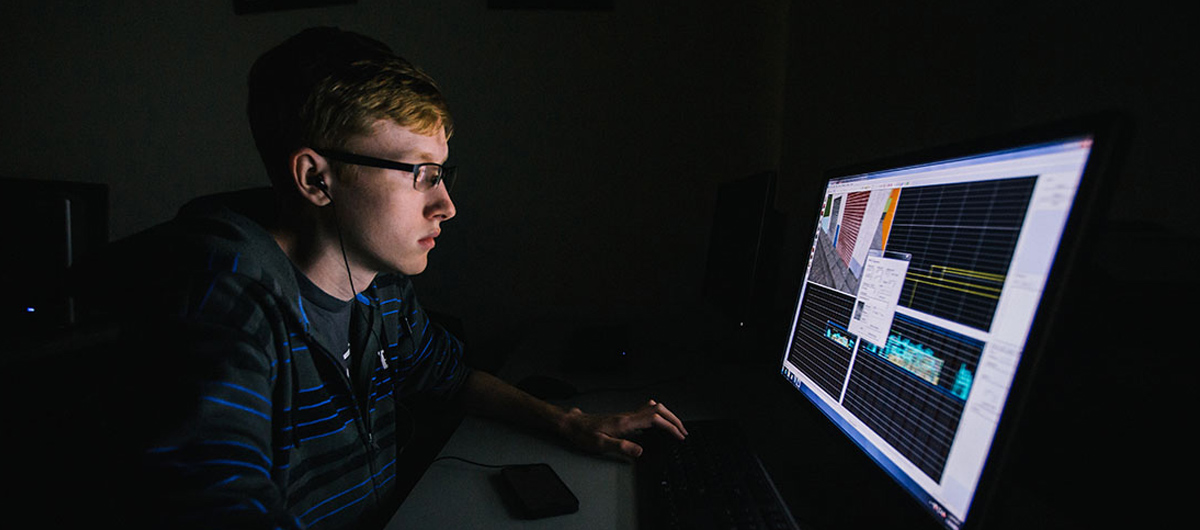Digital Gaming & Simulation

About the Program
The Digital Gaming and Simulation program offers career training that leads to employment in the industry as a game and simulation artists and/or programmers.
AWARD TYPES: Associate of Applied Science, Certificate Level 2
AREA OF STUDY: Art & Design
Degrees and Certificates
Learn more about the Degrees and Certificates offered by this program by visiting the HCC Catalog.
Program Outcomes
STUDENTS WILL BE ABLE TO:

Define and identify terminologies used in the gaming and simulation industry.

Demonstrate the use of appropriate tools to develop the assets.

Create documentation for game or simulation.

Develop assets for game or simulation.
Program Information
General Requirements
The Gaming & Simulation program prepares students to join one of today’s most dynamic creative-tech industries. Games and simulations are no longer “emerging” — they power global entertainment, education, healthcare, training, and research. Studios, startups, and organizations need skilled artists, designers, and programmers who can collaborate to create interactive experiences for multiple platforms.
Students in this program gain hands-on experience with industry-standard tools and workflows that drive careers in game development, real-time 3D, and immersive simulation.
- Game Artists develop skills in 2D and 3D art, modeling, animation, illustration, layout, user-interface and user-experience design, and visual storytelling for interactive worlds.
- Game Programmers build expertise in design logic, coding for real-time engines, optimization, debugging, and integrating gameplay systems with art and audio assets.
- Simulation Developers apply these skills to create realistic training, education, and enterprise applications—bridging creative design with technical execution.
Throughout the program, students work in collaborative teams to design and develop playable games and simulations, building professional-quality portfolios that prepare them for today’s fast-moving game and simulation industries.
TSI testing required prior to first enrollment for all AAS degrees and Level II certificates.
Additional Information (Texas Skill Standards Board)
Texas Skill Standards Board (TSSB) recognized programs:
- AAS in Digital Gaming and Simulation for Artists
- AAS in Digital Gaming and Simulation for Programmers
Accreditation
HCC is an accredited institutional member of the National Association of Schools of Art and Design (NASAD). Seven Art and Design Programs—Studio Art, Interior Design, Digital Communication, Fashion Design, Fashion Merchandising, Filmmaking, and Digital Gaming & Simulation for Artists—collectively represent the Art and Design Unit at HCC.
National Association of Schools of Art and Design (NASAD)
11250 Roger Bacon Drive, Suite 21
Reston, VA 20190-5248
Phone: 703-437-0700
Website: nasad.arts-accredit.org
Hybrid Programs Restrictions
Hybrid programs allow students to take a mix of online and face-to-face courses. Hybrid programs offer 50% to 85% of their courses online and the remainder of the curriculum is taken in-person on one of HCC’s campuses. Please contact your advisor for more information about specific program requirements.
Language Option Restrictions
Some hybrid programs require students to participate in foreign language courses as part of the program’s required curriculum. Please contact your advisor for more information about specific program requirements and available language options. If you would like to take courses in a language that is not offered online, you would have to do so on campus.
Elective Course Restrictions
Some hybrid programs may have a limited number of elective options available, based on which of the designated electives are currently offered online. Please contact your advisor for more information about specific program requirements.
Required Course Restrictions
Hybrid programs require students to participate in campus-based courses as part of a given program’s required curriculum. Please contact your advisor for more information about specific program requirements.
Potential Course Restrictions
Some online courses may have face-to-face requirements for exams, laboratory sessions, and other activities. Please review your course syllabus to determine if your online course has an on-campus laboratory or examination requirement.
Resources
Search for a Digital Gaming & Simulation Professor or request more information
Get in touch
Harold Scott
Faculty Division Chair
Hours of Operation: Mon.-Fri. 8am-5pm
